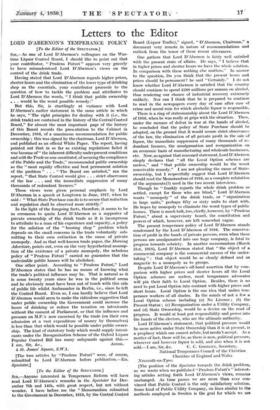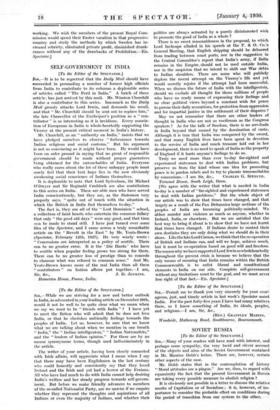[To the Editor of the SPECTATOR.]
.Sin,—Anyone interested in Temperance Reform will have read Lord D'Abernon's remarks in the Spectator for Dec- ember 7th and 14th, with great respect, but not without wonder. I have before me the "Memorandum submitted to the Government in December, 1916, by the Central Control Board (Liquor Traffic)," signed, "D'Abernon, Chairman," a document very remote in nature of recommendations and outlook from the tenor of these recent utterances.
One gathers that Lord D'Abernon is fairly well satisfied with the present state of affairs. He says, "I believe that in higher prices and shorter hours we have the whole solution. In comparison with these nothing else matters." In answer
to the question, Do you think that the present hours and prices should be permanent? he said "Certainly." I do not know whether Lord D'Abernon is satisfied that the country should continue to spend 2288 millions per annum on alcohol, thus rendering our chance of industrial recovery extremely unlikely. Nor can I think that he is prepared to continue to read in the newspapers every day of case after case of crime and moral ruin for which alcoholic liquor is responsible.
There is a ring of statesmanship about the Lord D'Abernon of 1916, when he was really at grips with the situation. Then, under the menace of defeat in war at the hands of alcohol, he concluded that the policy of State Purchase should be adopted, on the ground that it would secure strict observance of the law, the elimination of all private profit in the sale of liquor, the immediate suppression of many thousands of re- dundant licences, the amalgamation and reorganization on an economic basis of manufacturing and wholesale businesses, etc. Now, as against that reasoned statement,Lord D'Abernon simply declares that "all the Local Option schemes are useless," and "that public ownership would be the worst conceivable remedy." I am not pleading the cause of State- ownership, but I respectfully suggest that Lord D'Abernon should read the Memorandum of 1916, as a complete refutation of the arguments(?) used in the two recent interviews.
Though he " franldy regards the whole drink problem as settled, except for those who are blind," Lord D'Abernon wants " monopoly " of the drink trade, or " organization in large units," perhaps fifty or sixty units to start with He hopes by monopoly to eliminate the worst types of public houses. There is much talk, too, chiefly, however, by "Prudens Futuri," about a supervisory board, the constitution and powers of which, however, are left somewhat vague.
The present temperance policy of Lord D'Abernon stands
condemned by the Lord D'Abernon of 1916. The .conserva- tion of profit in the hands of private persons, even when these persons are amalgamated into one huge company, is fatal to progress towards sobriety. In another memorandum (March 31st, 1918), Lord D'Abernon stated that " the object of a commercial company is the commercial success of the under- taking " : that object would be as clearly defined and as magnetic to a monopoly as to groups.
Despite Lord D'Abernon's off-hand assertion that by com-
parison with higher prices and shorter hours all the Local Option schemes are useless, most temperance advocates will pin their faith to Local Option. Besides, there is no need to put Local Option into contrast with higher prices and short hours. Local Option is the one idea that unites tem- perance workers of all shades. In the minds of not a few a Local Option scheme including (a) No Licence ; (b) the Present Status ; (c) Reorganization under a Utility Company, and (d) State Ownership, would be a device on the road of progress. It would at least put responsibility and power into the hands of the electors, who are the ultimate authority.
Lord D'Abernon's statement, that political pressure would be more active under State Ownership than it is at present, is a prophecy which one cannot refute, but needn't accept. As a matter of fact, there will be, as there is now, political pressure, wherever and however liquor is sold, and also when it is not National Temperance Council of the Christian Churches of England and Wales Newcastle-on-Tyne.
[The position of the Spectator towards the_ drink problem, as we wrote when we published "Prudens Futuri's " interest- ing articles setting. forth Lord D'Abernon's views, remains unchanged. As time passes we are more than ever con. vinced that Public Control is the only satisfactory solution. Some kind of Public Utility Company, on lines similar to the .methods employed in Sweden is the goal for which we are working. We wish the members of the present Royal Com- mission would spend their Easter vacation in that progressive country and study the methods by which Sweden has in- creased sobriety, eliminated private profit, diminished drunk- enness without any of the drawbacks of Prohibition.—En. Spectator.]











































 Previous page
Previous page